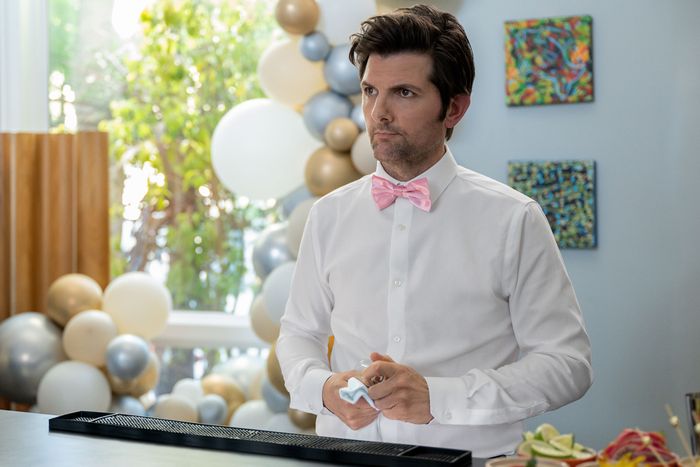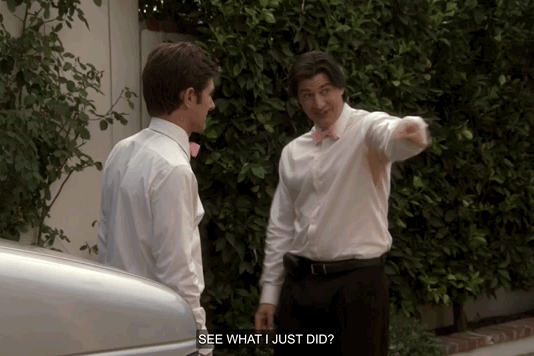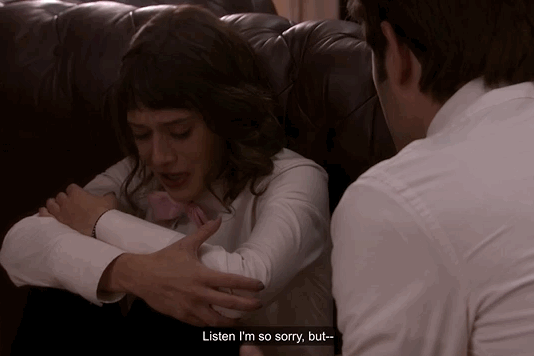
Originally airing from 2009–10, Party Down is a show about a ragtag group of Los Angeles cater waiters in different states of trying to achieve their Hollywood dreams. Henry Pollard, played by Adam Scott, isn’t the funniest character on Party Down. He’s not the biggest, craziest, or weirdest either. And having quit acting, he’s the only character without a motivation. But it’s through Scott’s performance — in the first two seasons more than a decade ago as well as in the third season premiering on Starz on February 24 — that Party Down achieves its grounded, world-weary tone. And in close collaboration with showrunner John Enbom, Scott subverts the cliché of the unknown actor trying to make it and instead offers a unique perspective on the Hollywood dream.
On Good One, Scott and Enbom discuss the six scenes that epitomize Henry’s evolution over the course of the series from the moment he pulls up in a beat-up BMW he bought with his old beer-commercial money in the pilot to the show’s third season, which the producers dubbed “The Last Temptation of Henry.” Read some excerpts from the interview below, or listen to the full episode of Good One wherever you get your podcasts.
Season 1, Episode 1: “Willow Canyon Homeowners Annual Party”
Failed actor Henry is catering his first party in years. While smoking a cigarette outside, he meets Casey (Lizzy Caplan). After she recognizes him, he reveals that, yes, he was the “Are we having fun yet?!” commercial guy. Casey says, “I remember you. What are you doing here?” He responds, “Do you remember me from anything else?”
Adam Scott: Everyone in the cast connected directly with these characters. Success was just a little beyond our grasp, and we all had our faces pressed up against the glass of showbiz. It’s a tough racket when you’re not quite there yet, everything is embarrassing, and you want to disappear like eight times a day when people ask you certain questions.
John Enbom: When we originally had the idea for the show, one of the first things we thought of was that you recognized these people you would see on TV, like in ads, but not for the thing they clearly wanted to be recognized for. Like the “Can you hear me now?” guy. That led us to the idea of this guy who had simply made a wrong turn and ended up in a place of stasis. It was an interesting twist on the usual “fame and success” narrative. We imagined Henry’s satisfaction when he gets this big ad campaign and buys his car. He’s driving a beat-up BMW when we first see him.
AS: I had never been in the center of a TV show before — in the sense that Henry’s the person all the people revolve around. Up to that point, I’d just been playing small parts, so you get into the habit of trying to put everything into these “single scenes” you might have. Fred Savage was directing that episode. I remember him pulling me aside and being like, “Listen, you can just relax. All you have to do is sit here and listen to Casey and enjoy it. You have plenty of time to throw in all these different things you’re feeling and thinking. But for now, we’re gonna see a lot of you, so don’t worry about it.” He knew exactly what I was doing and how to remedy it, because he’d been at the center of a couple of TV shows.
JE: We worried about Henry the character more than anybody else, because he’s almost an inside-out protagonist. He’s not striving for anything. He’s not on his way to anything. It was the hardest role of the whole cast. All of our other characters have their own delusions or ambitions that give them an easy handle on who they are and what they’re doing. Henry’s kind of nowhere. We talked about that a lot: “Are we setting ourselves up for a problem by having this main character in such an airless place?” We were very fortunate that Adam was able to find the compelling sides of that situation.
Season 1, Episode 6: “Taylor Stiltskin Sweet Sixteen”
Henry’s old friend from acting school Michael (Breckin Meyer) shows up to a Party Down–catered birthday party for the daughter of powerful producer Leonard Stiltskin (J.K. Simmons). Michael is playing a vampire-hunting Edgar Allen Poe in Stiltskin’s next movie and asks Henry what happened to his career, since he was the best actor in their class. Henry reveals that he believes the “Are we having fun yet?” ads killed his career, and Michael says he’s going to talk to Leonard, because Henry would make a perfect young Abraham Lincoln. At first Henry demurs, but eventually he finds himself getting excited about this possible break.
JE: This was the first moment we got a sense that people thought of Henry as a talented guy. You’re surprised to see him tending bar while you’re doing big movies.
AS: It’s this extra layer of humiliation that we get to peel back: Henry at first says, “No, I’ve quit.” Then pushed ever so slightly, he’s like, “Yeah, that’s great.” Then pushed a little more, he’ll talk to the producer. Pushed a little more, he’ll perform the most humiliating five words of his life for the producer’s daughter. Then he gets left behind — even more humiliated than he was before.
JE: We wanted to play the nuances of Henry’s up-and-down experience of holding out. He always holds this little buried shred of hope, and it never quite comes together. But it’s always there, because it’s not that he’s turned his back on it. It’s that he’s burned out on it.
Season 2, Episode 2: “Precious Lights Pre-School Auction”
Henry is now the manager of Party Down catering, and his former boss Ron (Ken Marino) is the messed-up trouble-making employee. After being a disruptive ass in front of the staff, Ron asks to talk to Henry outside. Ron claims he did it all on purpose to teach Henry a lesson about managing. Annoyed, Henry screams at Ron about his poor hygiene and says if he shows up late again, he’ll be fired. Based on Ron’s hurt reaction, Henry pretends he was joking.
JE: We had been toying with the “What are we doing here?” nature of the Henry-Casey relationship. In the high-school-reunion episode, we get that sense that he’s considering, What if I just bail out of here? What if I just move back home and start over? He finally rejects that idea and decides to stay, partly because of Casey. But then she went off on a cruise-ship comedy tour. That left Henry in this place where he had nothing. So he was embracing a chance to have a little more life without any enthusiasm, which we see both in him accepting this supervisor job and ending up in a relationship with Kristen Bell’s character. We were interested in the ultimate irony that he achieves the upward movement he couldn’t get in his creative life in this catering life.
AS: It was another avenue I completely understood as a freelance actor. I remember in my 20s living in this studio apartment, going from job to job, and watching my brother and sister have their houses and their jobs and their families, and I was nowhere. That whole thing was so attractive to Henry, and he felt settled and more like a real person. However boring it might be to him, even if he doesn’t realize it, it’s precisely where he felt he needed to be. But it’s more like Henry’s trying to be boring and trying to keep down all the things about him that aren’t boring, because those things haven’t worked out very well for him. Then Casey shows up and it’s like, Well, shit. That’s a non-boring thing. Then Ron shows up and it’s like, Well, goddammit, now things are really going off the tracks. The character is trying his best to lead a normal life and suppress his creative impulses.
Season 2, Episode 5: “Steve Guttenberg’s Birthday”
Steve Guttenberg (Steve Guttenberg) cancels the birthday party he had planned but forgets to tell Party Down catering, so he invites the gang to hang out and party. He convinces everyone to perform one of Roman’s (Martin Starr) screenplays. The first attempt goes terribly, but Steve encourages them to rewrite it and add more pathos. On the second attempt, Casey tells Henry she’s going to act his “ass into next week,” but Henry says he’s retired and doesn’t care. When Casey says, “You’re a massive, enormous pussy,” Henry responds, “I can act you under the table with one feeling tied behind my back.” They perform the scene, and Henry blows everyone away.
JE: It gave us an opportunity for Henry to actually perform. We get to both see him do it and have Casey see him doing it. She’s able to see that he’s a good, insightful, enthusiastic actor — that he is willing to do it when goaded in the right way. It becomes this pivot point in their relationship reigniting.
AS: When you see fake stand-up or music in a movie and people are going crazy for it, the audience enthusiasm always seems fake. But John really threaded the needle, because it’s in the context of Roman’s ridiculous sci-fi script. We’re injecting emotion into that world. Then you see some genuine emotion between Casey and Henry. It’s a chance for them to reconnect. It’s a chance for her to see something in him.
JE: The performance wouldn’t have worked at all without the first run-through, which established that everyone’s kind of skeptical, and they’re playing it in this stiff, cartoony way. Everyone’s rolling their eyes. It was key both to getting everyone into the spirit of this whole endeavor and getting the audience to root for the idea that they have fixed up the script. It’s that combination that made it actually work, because you get the sense that there are all these different things going on, and you’re hoping for these various outcomes for all these different characters — including Henry and Casey.
AS: It reawakens something in Henry to maybe not be so afraid of this thing and maybe not have this antagonistic relationship with acting. He lets go of all of that and has an incredible moment with acting artistically and with Casey. It’s clear that those are the two most important things to him.
Season 2, Episode 10: “Constance Carmell Wedding”
Casey is cut out of the Judd Apatow movie she thought would be her big break. Henry tries to console her by telling her she’s going to make it, but Casey rebuffs him because he quit pursuing his dream. “If you’re not crazy enough to believe it for you,” she says, “how are you going to believe it for me?”
JE: We wanted to avoid the idea of your two cute leads meeting each other and the whole show is about “Will they or won’t they?” We wanted the exact opposite: have them hit it off right away, but then the obstacle is that they’re on opposite sides of this divide. Casey is very driven, ambitious, and determined to make this work, and it’s the sole focus of her life, while Henry’s on the other side. He’s been there, but now he’s somewhere else. We always referred to it as a “hope gap” between them. They had this wonderful, weird workplace thing, but the idea that it was bigger than that was always hampered by this difference between them. It was this relationship that could never quite get out of the show it was trapped in.
AS: While acting, my thing was always, He’s in love with Casey and he will navigate everything according to that, because he wants his life to be with her. And when this thing isn’t working out for her, it’s almost like, way deep down inside, he’s like, Well, yeah! That’s how this works! This doesn’t work out, so now we can just be together and people who aren’t really involved in show business, because it’s a heartbreaker. He’s a bit selfish in that moment.
JE: The difference between them is that she’s willing to make every sacrifice, and that includes having a different attitude toward the relationship with Henry. For better or worse in her mind, Henry has stopped believing, which alters the kind of relationship they can have.
Season 3, Episode 1: “Kyle Bradway Is Nitromancer”
After years apart, the original Party Down team (minus Casey) is at a party celebrating Kyle’s (Ryan Hansen) new role in a big movie. Although Party Down is working the event, only Ron and Roman are still catering. At the moment, Henry is a teacher, Lydia (Megan Mullally) is a manager, and Constance (Jane Lynch) is an actress, playwright, widow, heiress, and patron of the arts. Henry catches up with Ron outside. Everything is pleasant until Ron mentions the big break that explains Casey’s (and Caplan’s) absence.
JE: One of the things we discarded immediately was the idea that we would pick up 12 years later with everyone there doing the job. It would just be too dark that not one person had moved on anywhere in their lives and was still doing this job that they never really wanted to be doing in the first place. When we first started talking about it, we did have this idea for a Henry-Casey reunion. When we found out she wasn’t available, we had to reconceive some things, but we didn’t have to completely rewrite episodes.
AS: It was a huge bummer, obviously, for us and for Lizzy, because she really wanted to do it as well. It’s just that schedules didn’t work. The fact that we found six weeks where almost everybody could be together and make the show was a miracle anyway. But I feel like when that obstacle popped up, the way John pivoted and made her absence a part of the show fit in perfectly with the Party Down ethos.
JE: We landed on the idea that Henry was teaching, because we felt like he was never someone who was going to abandon the ideas that had propelled him into acting. Then we had to figure out, How did that get messed up? There’s this desire for a life as opposed to just day-by-day chaos. He longs for a stability of one sort or another.
AS: It was great to harness the exposition in a way that Henry feels like he has to share it with somebody. He can’t believe where he has ended up and the manner in which he ended up there. He was having similar feelings that I was having: me being on the Party Down set in 2022 and him having a moment at a Party Down party for Kyle getting a big movie. I don’t think Henry is at the place yet where he’s admitting to himself that it’s depressing. He’s almost there. He’s at the point where he needs to talk about it with someone, but he’s still in it. He’s still living that life, so he needs to share it in order to justify it.
JE: We only see it for half a second, but we had a whole discussion of exactly what kind of middle-of-the-road car Henry is tooling around in now that represents where he’s at — a car that gets the job done but is not a BMW.
AS: I saw the signal of where Henry was at in the wardrobe of the teacher gear: the corduroy jacket with the plaid shirt, the khakis, and the brown shoes. It looks like he came straight from the high school where he’s working.
JE: As the season continued, we wondered, What do we do with Henry in these circumstances, where he has kind of moved on? We started to think about this idea that the thing that happens — and without going into too much detail — is from a place where he’s settled and he’s tempted. We kept referring to it as “The Last Temptation of Henry.” What would it take to get him to imagine this kind of life that he had long ago stopped imagining for himself?
This interview has been edited and condensed.




